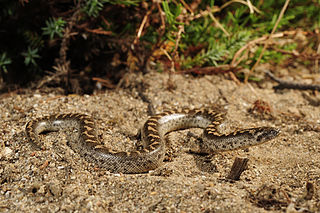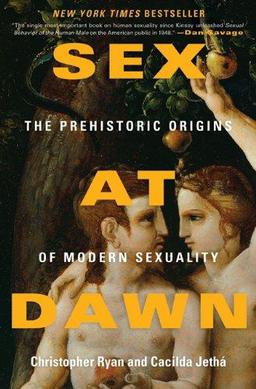Evolutionary psychology is a theoretical approach in psychology that examines cognition and behavior from a modern evolutionary perspective. It seeks to identify human psychological adaptations with regards to the ancestral problems they evolved to solve. In this framework, psychological traits and mechanisms are either functional products of natural and sexual selection or non-adaptive by-products of other adaptive traits.

Steven Arthur Pinker is a Canadian-American cognitive psychologist, psycholinguist, popular science author, and public intellectual. He is an advocate of evolutionary psychology and the computational theory of mind.

Sociobiological theories of rape explore how evolutionary adaptation influences the psychology of rapists. Such theories are highly controversial, as traditional theories typically do not consider rape a behavioral adaptation. Some object to such theories on ethical, religious, political, or scientific grounds. Others argue correct knowledge of rape causes is necessary for effective preventive measures.
Sex differences in psychology are differences in the mental functions and behaviors of the sexes and are due to a complex interplay of biological, developmental, and cultural factors. Differences have been found in a variety of fields such as mental health, cognitive abilities, personality, emotion, sexuality, friendship, and tendency towards aggression. Such variation may be innate, learned, or both. Modern research attempts to distinguish between these causes and to analyze any ethical concerns raised. Since behavior is a result of interactions between nature and nurture, researchers are interested in investigating how biology and environment interact to produce such differences, although this is often not possible.
Gordon G. Gallup Jr. is an American psychologist in the University at Albany's psychology department, researching biopsychology.

How the Mind Works is a 1997 book by the Canadian-American cognitive psychologist Steven Pinker, in which the author attempts to explain some of the human mind's poorly understood functions and quirks in evolutionary terms. Drawing heavily on the paradigm of evolutionary psychology articulated by John Tooby and Leda Cosmides, Pinker covers subjects such as vision, emotion, feminism, and "the meaning of life". He argues for both a computational theory of mind and a neo-Darwinist, adaptationist approach to evolution, all of which he sees as the central components of evolutionary psychology. He criticizes difference feminism because he believes scientific research has shown that women and men differ little or not at all in their moral reasoning. The book was a Pulitzer Prize Finalist.

David Michael Buss is an American evolutionary psychologist at the University of Texas at Austin, researching human sex differences in mate selection. He is considered one of the founders of evolutionary psychology.

A psychological adaptation is a functional, cognitive or behavioral trait that benefits an organism in its environment. Psychological adaptations fall under the scope of evolved psychological mechanisms (EPMs), however, EPMs refer to a less restricted set. Psychological adaptations include only the functional traits that increase the fitness of an organism, while EPMs refer to any psychological mechanism that developed through the processes of evolution. These additional EPMs are the by-product traits of a species’ evolutionary development, as well as the vestigial traits that no longer benefit the species’ fitness. It can be difficult to tell whether a trait is vestigial or not, so some literature is more lenient and refers to vestigial traits as adaptations, even though they may no longer have adaptive functionality. For example, xenophobic attitudes and behaviors, some have claimed, appear to have certain EPM influences relating to disease aversion, however, in many environments these behaviors will have a detrimental effect on a person's fitness. The principles of psychological adaptation rely on Darwin's theory of evolution and are important to the fields of evolutionary psychology, biology, and cognitive science.

Sexual jealousy is a special form of jealousy in sexual relationships, based on suspected or imminent sexual infidelity. The concept is studied in the field of evolutionary psychology.

Roy Frederick Baumeister is an American social psychologist who is known for his work on the self, social rejection, belongingness, sexuality and sex differences, self-control, self-esteem, self-defeating behaviors, motivation, aggression, consciousness, and free will.
Evolutionary psychology seeks to identify and understand human psychological traits that have evolved in much the same way as biological traits, through adaptation to environmental cues. Furthermore, it tends toward viewing the vast majority of psychological traits, certainly the most important ones, as the result of past adaptions, which has generated significant controversy and criticism from competing fields. These criticisms include disputes about the testability of evolutionary hypotheses, cognitive assumptions such as massive modularity, vagueness stemming from assumptions about the environment that leads to evolutionary adaptation, the importance of non-genetic and non-adaptive explanations, as well as political and ethical issues in the field itself.

Jonathan Gottschall is an American literary scholar specializing in literature and evolution. He holds the title of Distinguished Fellow in the English department of Washington & Jefferson College in Pennsylvania. He is the author or editor of eight books.

A Natural History of Rape: Biological Bases of Sexual Coercion is a 2000 book by the biologist Randy Thornhill and the anthropologist Craig T. Palmer, in which the authors argue that evolutionary psychology can account for rape among human beings, maintain that rape is either a behavioral adaptation or a byproduct of adaptive traits such as sexual desire and aggressiveness, and make proposals for preventing rape. They also criticize the assumption that there is a connection between what is naturally selected and what is morally right or wrong, which they refer to as the "naturalistic fallacy", and the idea, popularized by the feminist author Susan Brownmiller in Against Our Will (1975), that rape is an expression of male domination and is not sexually motivated.

Susan Pinker is a psychologist, author and social science columnist for The Wall Street Journal. She is a former weekly columnist for The Globe and Mail, and has also written for The New York Times, The Guardian, and The Times of London. Her first book, The Sexual Paradox, was awarded the William James Book Award in 2010 and was published in 17 countries. Her recent book The Village Effect was a Canadian bestseller and an Apple 2014 nonfiction best pick. Her work has been featured in The Economist, The Financial Times, and Der Spiegel.

Sex at Dawn: The Prehistoric Origins of Modern Sexuality is a 2010 book about the evolution of human mating systems by Christopher Ryan and Cacilda Jethá. In opposition to what the authors see as the "standard narrative" of human sexual evolution, they contend that having multiple sexual partners was common and accepted in the environment of evolutionary adaptedness. The authors contend that mobile, self-contained groups of hunter-gatherers were the norm for humans before agriculture led to high population density. Before agriculture, according to the authors, sex was relatively promiscuous and paternity was not a concern. This dynamic is similar to the mating system of bonobos. According to the book, sexual interactions strengthened the bond of trust in the groups. Far from causing jealousy, social equilibrium and reciprocal obligation were strengthened by playful sexual interactions.
The theoretical foundations of evolutionary psychology are the general and specific scientific theories that explain the ultimate origins of psychological traits in terms of evolution. These theories originated with Charles Darwin's work, including his speculations about the evolutionary origins of social instincts in humans. Modern evolutionary psychology, however, is possible only because of advances in evolutionary theory in the 20th century.

The Evolution of Human Sexuality is a 1979 book about human sexuality by the anthropologist Donald Symons, in which the author discusses topics such as human sexual anatomy, ovulation, orgasm, homosexuality, sexual promiscuity, and rape, attempting to show how evolutionary concepts can be applied to humans. Symons argues that the female orgasm is not an adaptive trait and that women have the capacity for it only because orgasm is adaptive for men, and that differences between the sexual behavior of male and female homosexuals help to show underlying differences between male and female sexuality. In his view, homosexual men tend to be sexually promiscuous because of the tendency of men in general to desire sex with a large number of partners, a tendency that in heterosexual men is usually restrained by women's typical lack of interest in promiscuous sex. Symons also argues that rape can be explained in evolutionary terms and feminist claims that it is not sexually motivated are incorrect.
Mate preferences in humans refers to why one human chooses or chooses not to mate with another human and their reasoning why. Men and women have been observed having different criteria as what makes a good or ideal mate. A potential mate's socioeconomic status has also been seen important, especially in developing areas where social status is more emphasized.
Brenda Nelle Major is an American social psychologist and distinguished professor in the Department of Psychological and Brain Sciences at the University of California, Santa Barbara, where she heads the Self and Social Identity Lab.
Rebecca Campbell is a professor of psychology at Michigan State University. She is known for her research pertaining to sexual assault and violence against women and children and the effects of treatment by law enforcement and medical staff on victims' psychological and physiological well-being. Campbell has been involved in criminal justice research on the investigation of Detroit's untested rape kits, wherein DNA evidence obtained in thousands of rape kits was left in storage and not analyzed. She has received numerous awards for her work including the Society for the Psychological Study of Social Issues Louise Kidder Early Career Award (2000), the American Psychological Association (APA) Early Career Award for Distinguished Contributions to Psychology in the Public Interest (2008), the APA Division 27 Council on Educational Program's Excellent Educator Award (2015), and the U.S. Department of Justice Vision 21 Crime Victims Research Award (2015).











